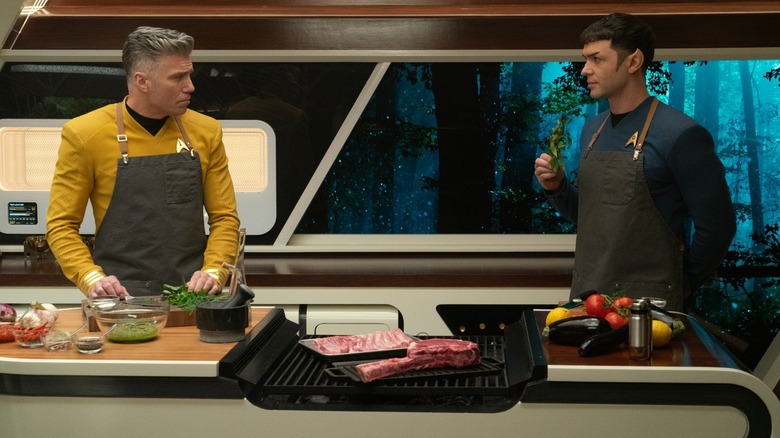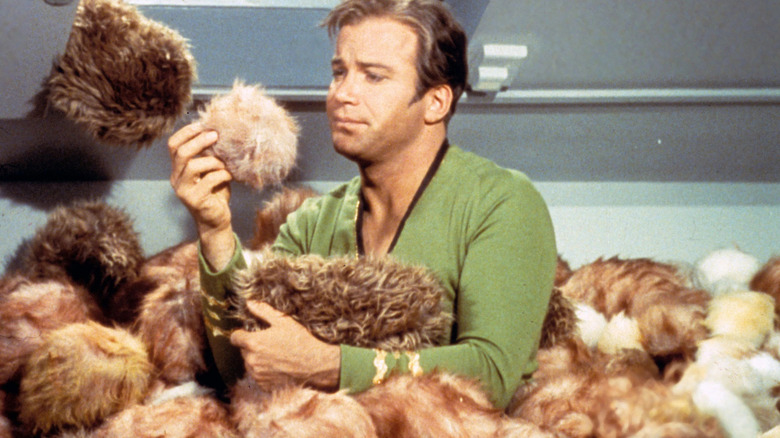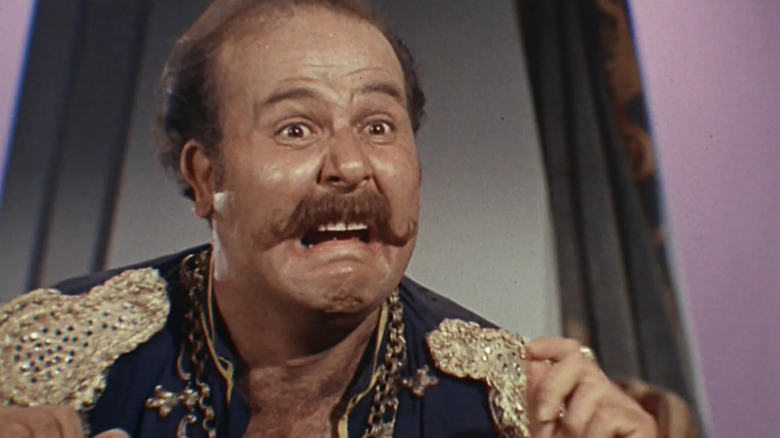Star Trek Has Known How To Do Comedy Since The 1960s
This post contains spoilers for the "Star Trek: Strange New World" episode, "Charades."
In the latest episode of "Star Trek: Strange New Worlds," called "Charades," Spock (Ethan Peck) and Nurse Chapel (Jess Bush) get into a shuttlecraft accident while flying through a colossal negative space wedgie. Spock is injured. Luckily, there are some noncorporeal space aliens living inside the negative space wedgie, and they have medical technology beyond our wildest dreams. But because Spock is half-human and Chapel is all human, the aliens get confused, and "correct" the anomaly by removing Spock's Vulcan DNA, transforming him into a complete human.
"Charades" could have easily been about Spock using his sudden change of species to contemplate his dual identity. It could have, perhaps, been about how Spock is treated differently now that he's human. Instead, the showrunners made "Charades" into a comedy episode reminiscent of Mike Nichols' 1996 film "The Birdcage" (itself an adaptation of the 1973 play "La Cage aux Folles"). Spock is transformed into a human, you see, only a few days before his ultra-Vulcan in-laws-to-be are scheduled to arrive in the Enterprise for a vital introductory dinner. The drama of the episode surrounds whether or not Spock will be able to behave like a Vulcan in front of his in-laws when his new human DNA has him hungry, angry, and horny like a teenager.
One might recall that "The Birdcage" is about a dinner with potential in-laws who are ultra-conservative. The groom's two dads have to pretend to be a straight couple for an evening. It's funnier and more progressive than it sounds.
"Star Trek," of course, has had its share of comedy episodes in its long history, often using humorous predicaments to take the air out of its ordinarily mannered, stuffed-shirt characters. Sometimes, it's okay to poke a little fun at a Starfleet captain.
Some of them are actually funny!
Because "Star Trek" is set in an ultra-professional environment — on board a military-run, government space vessel — the characters all have to be on their best behavior. They adhere to a strict code of formalism and address each other by rank. The vast bulk of characters on "Star Trek" belong to Starfleet or another equally formal governmental military institution. As such, when a free agent or informal character enters the show, they often flit about the Captains and Lieutenants, gently mocking their stuffiness.
Or, in the case of the famous episode, "The Trouble with Tribbles" (December 29, 1967), an adventurer like Kirk (William Shatner) finds himself utterly annoyed by a mission to protect something as commonplace and unexciting as a grain shipment. The dreaded tribbles of the title are cooing balls of fur with voracious appetites. To the diplomats on a space station, the grain is valuable. For Kirk, he doesn't much care, but he's required to care because its his job. The comedy from "Tribbles" stems from Kirk's stone-faced embarrassment. That, and the fact that the tribbles are weird little critters.
Starfleet stuffiness also stands out when a laidback, outrageous character swoops in for an episode. One might recall Trelane (William Campbell), the goofy Squire of Gothos. Or perhaps the lascivious, cackling Harry Mudd (Roger C. Carmell) who, in the episode "I, Mudd" (November 3, 1967), locks Kirk and company into a room with hundreds of silly androids. The Enterprise crew has to dance and cavort and overact to — get this — confuse the androids to death. It's amusing to see them out of character.
Some of them, not so much
Of course, the Harry Mudd episodes aren't always amusing. Remember that "Star Trek" was made in the late 1960s when a certain kind of sexist humor was still common on television. One of the central jokes of "I, Mudd" is that Harry has created an android of his ex-wife whom he has programmed ... sigh ... to be a nag. The idea is that she will nag him, and he finally has the option of shutting her up by command. His punishment at the end of the episode is to be locked in a building with a thousand copies of his ex-wife. "Nagging wife" jokes, thankfully, went out of vogue decades ago.
Other "wild" characters include the Outrageous Okona, Lwaxana Troi, Q, and just about every Ferengi.
The bulk of the comedy episodes, however, involve the formal characters behaving out of character, often so they may do silly things. One might recall "Qpid" (April 22, 1991), which saw Captain Picard (Patrick Stewart) and his crew transformed into characters from Robin Hood. They also became part of Holodeck Sherlock Holmes or Dixon Hill mysteries. In "The Elysian Kingdom" on "Strange New Worlds," the crew became characters in a children's fantasy novel. In the "Voyager" episode "Bride of Chaotica!," the characters enacted a 1940s sci-fi adventure serial (in black and white, even!). In the "Deep Space Nine" episode "Our Man Bashir," the crew became characters in a James Bond-style action film. Even the broad comedy series "Lower Decks" had role-playing episodes set on the holodeck of the U.S.S. Cerritos.
Comedy comes naturally to a universe full of pompous, well-behaved characters. It doesn't take much to introduce a chaos element. And from that chaos, yuks springs.


